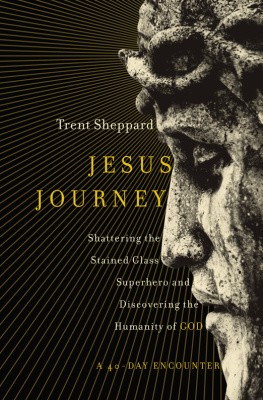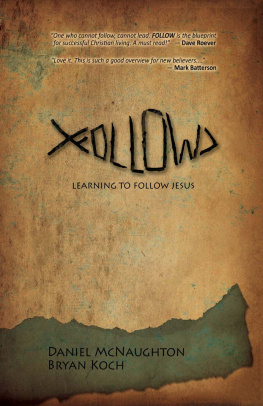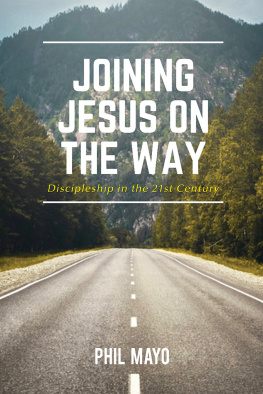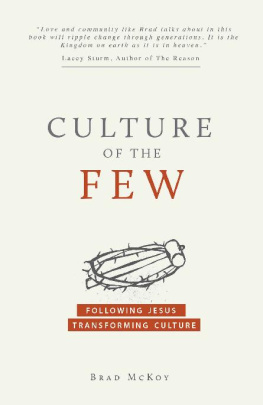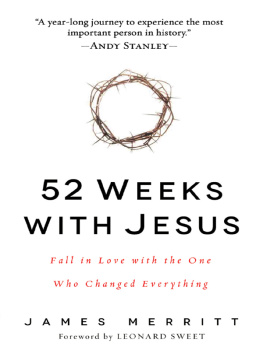I thank Dan McKaughan for reading and offering comments on the book.
Introduction
M ark is the earliest Gospel written. It is short. It moves quickly. The Gospel is written in koin Greek, the rough language spoken by commoners and not the polished Greek of literature.
The title, According to Mark, was not put there by the author. Others affixed it to the book at the time the four Gospels were made part of the Christian canon several centuries later. In a tradition of the early church that is cautiously accepted by many contemporary scholars, the author was the John Mark spoken of in the book of Acts. The earliest recorded comment about Mark outside of the New Testament was attributed to Papias by the church historian Eusebius. Papias was bishop of Hierapolis, a city of Asia Minor, in the early decades of the second century.
Papias stated that Mark, having become the interpreter/translator of Peter, wrote down accurately, however, not in order, all that he recalled of what was either said or done by the Lord. For he had neither heard nor followed the Lord; but later (as I said) he followed Peter.... Mark did no wrong in thus writing down some things as he recalled them, for he made it his aim to omit nothing he had heard and to state nothing therein falsely.
In this tradition, then, John Mark was not one of the original followers of Jesus but listened to the disciple Peter tell his stories about Jesus and wrote those stories down. Papias believed that Marks record accurately reflected Peters account.
Mark probably finished his Gospel some time before the fall of Jerusalem to the Romans in CE. Matthew and Luke later incorporated much of Marks structure and most of his text into their own accounts of Jesus life. The Gospel of John tells the story of Jesus from its own distinct vantage. Marks unpolished stories present a man of great goodness and power who was able to confront persons with the truth about who we are, yet beckon us to him with an empowering vision of the persons we can become.
The word gospel, which means good news, is particularly appropriate for the book of Mark. Of the four Gospel authors Mark alone applies this word to his own text (:) and Jesus calls the message he brings good news numerous times in Mark (:, ; :; :; :; :).
Mark narrates a series of episodes in which Jesus teaches, acts forcefully, and is repeatedly challenged. Marks Jesus brings to life some of the great biblical themes: the kingdom of God, a perspective on the character of the Messiah, and the bold invitation, Follow me. Yet Mark refuses to provide the reader with easy answers. Why do the first disciples suddenly drop everything they have been doing to follow Jesus? Mark does not tell us. Marks treatment of faith seems tangibly human. The disciples follow Jesus long before they are ready to claim that he is the Messiah. And when they reach that point, the belief they come to is apparently the wrong understanding of the Messiah. The disciples repeatedly stumble and fall short as soon as we get them into focus, and Mark never lets up. He does not try to explain Jesus acts of power or the resurrection. Why, for instance, does Mark leave us abruptly at the empty tomb in the original ending of the book (:)? His lack of easy answers is combined with a subtlety and irony that can speak powerfully to modern readers.
The present study began as a seminar for young adults. It is written for inquirers, for persons who dont mind raising questions, who want to read the Gospel of Mark intelligently and would like to know enough about the background setting to be able to understand the tensions represented in the give and take of participants in Marks text.
I am particularly interested in the person of Jesus portrayed by Mark. My aim in the present study is to set out to understand Jesus in the text as Mark wrote it, avoiding as much as possible theological assumptions about Jesus that come from a later age, be it contemporary historical/critical, or from the Council of Nicea. Scholarly sources will be used, however, to help us understand first-century Judaism. We will pay particular attention to quotations Mark provides as context for the story he is presenting.
The boldface Mark text for this commentary (with one exception) and most other direct biblical quotations come from the New Revised Standard Version (NRSV) translation. The Songs of the Servant of Yahweh come from the Jerusalem Bible (JB) translation. Other Bible translations will be credited when they are used. The comment sections include paraphrased quotations and my own translations based on my study of Marks Greek text.
If we simply study Mark as history or as literature we can miss the intense personal significance an encounter with Jesus can have. Jesus often addressed persons as individuals. I desire to be open to a first person response to Jesus and hope that readers will also be open to such a response. Thus this study is written not only in third person but sometimes finds expression in first and second person. Mark was an intelligent writer. What happens if we allow Marks Jesus to teach us what it means to be a Christian?
On a personal note, I was tormented for a number of years over certain doctrines that I had been taught a Christian had to believe. Not that I necessarily believed them to be false; but I was not able to persuade myself that they were positively true and affirm them as my own. One day, after talking to a Presbyterian minister, I realized that if I had to believe that Jesus was God-manI simply was not a Christian. While it was in some sense freeing to face that truth, it also tormented me. I began trying to figure out which doctrines would be absolutely essential to being a Christian. Somehow I was unable to get enough traction on that course to move on.
After graduate school in psychology I taught a liberal arts seminar one term at the University of Oregon entitled, In Search of Stature. We explored characteristics that give stature, nobility, or courage, to Homers Odysseus, Platos Socrates, Abraham in Genesis, and Marks Jesus, among others. I recall lying on the rug of our rented cottage in front of a Ben Franklin stove one morning to read the Gospel of Mark assignment. I opened the book to begin reading.
I met him there.
He was walking on the pebbly shore of the Sea of Galilee. He watched Simon Peter and his brother Andrew cast a net into the lake, for they were fishermen. Jesus said to them, Follow me, and I will make you fishers of men. At once they left their nets and followed him.
The story shocked me in its vividness, its simplicity, in what was not said. Jesus did not walk down the beach with an arm over Peters shoulder interrogating him. He did not ask, first thing, Do you believe that I am God incarnate? and double-check for accuracy. No. He said simply, Follow me. I will teach you to make something more of your life.
At that moment I heard his voice, Larry, you follow me.
That, I answered emphatically, is something I can do!
It was a moment of ecstasy for me. I felt a sudden weight lift. The shackles of creeds that had tormented me broke loose. I experienced the freedom of new insight for the way.
So I followed Jesus and with Peter, Andrew, and two other brothers, James and John, I followed him through the book of Mark. I discovered that in Mark and in the other Gospels, Follow me is a characteristic way Jesus has of inviting people along his path. Not the only way, of course. And I discovered that the meaning of the invitation to follow him takes on added depth somewhere along the line. But for starters you and I, and Matthew, and others, are invited to come and see.




